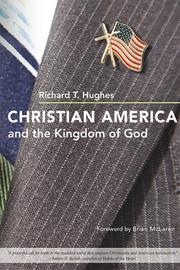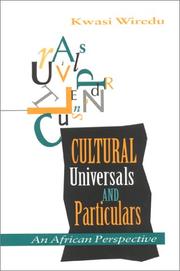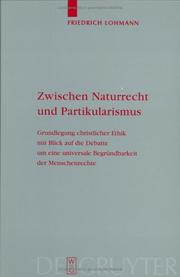| Listing 1 - 10 of 23 | << page >> |
Sort by
|
Book
Year: 1651 Publisher: London : Printed by Will. Bentley,
Abstract | Keywords | Export | Availability | Bookmark
 Loading...
Loading...Choose an application
- Reference Manager
- EndNote
- RefWorks (Direct export to RefWorks)
eebo-0014
Particularism (Theology) --- Arminianism --- Theology, Doctrinal.
Book
ISBN: 1498542425 1498542433 9781498542432 9781498542425 Year: 2017 Publisher: Lanham, Maryland
Abstract | Keywords | Export | Availability | Bookmark
 Loading...
Loading...Choose an application
- Reference Manager
- EndNote
- RefWorks (Direct export to RefWorks)
Judaism --- Particularism (Theology) --- Judaism and philosophy. --- History
Book
ISBN: 9782917090039 2917090030 9782917090039 2917090030 Year: 2008 Publisher: Saint-Ouen : [Paris] : IIIT France ; Unesco,
Abstract | Keywords | Export | Availability | Bookmark
 Loading...
Loading...Choose an application
- Reference Manager
- EndNote
- RefWorks (Direct export to RefWorks)
Islam --- Religions --- Religious pluralism --- Pluralisme religieux --- Social aspects --- Relations --- Aspect social --- Identity (Philosophical concept) --- Particularism (Theology) --- Religious pluralism - Congresses --- Identity (Philosophical concept) - Congresses --- Particularism (Theology) - Congresses

ISBN: 1283044013 9786613044013 025209154X 9780252091544 9780252032851 0252032853 9781283044011 6613044016 0252078896 9780252078897 Year: 2009 Publisher: Urbana
Abstract | Keywords | Export | Availability | Bookmark
 Loading...
Loading...Choose an application
- Reference Manager
- EndNote
- RefWorks (Direct export to RefWorks)
Particularism (Theology) --- Kingdom of God --- Christianity and politics --- Election (Theology) --- God, Kingdom of --- Eschatology --- God (Christianity) --- Biblical teaching. --- Political aspects
Book
ISBN: 9789004292680 9004292683 9789004292697 9004292691 Year: 2015 Publisher: Leiden BRILL
Abstract | Keywords | Export | Availability | Bookmark
 Loading...
Loading...Choose an application
- Reference Manager
- EndNote
- RefWorks (Direct export to RefWorks)
In this tribute to Steven T. Katz on the occasion of his seventieth birthday, Michael Zank and Ingrid Anderson present sixteen original essays written by senior and junior scholars in comparative religion, philosophy of religion, modern Judaism, and theology after the Holocaust, fields of inquiry where Steven Katz made major contributions over the course of his distinguished scholarly career. The authors of this volume, specialists in Jewish history, especially the modern experience, and Jewish thought from the Bible to Buber, offer theoretical and practical observations on the value of the particular. Contributions range from Tim Knepper’s reevaluation of the ineffability discourse to the particulars of the Settlement Cookbook, examined by Nora Rubel as an American classic.
Jewish philosophy --- Particularism (Theology) --- 296 <082> --- Election (Theology) --- Judaïsme. Jodendom--Feestbundels. Festschriften --- Festschrift - Libri Amicorum --- Jewish philosophy. --- Philosophy, Jewish --- Jews --- Philosophy, Israeli --- Philosophy --- 2000 - 2099
Book
ISBN: 1644696150 1644696142 1644696134 1644697025 Year: 2021 Publisher: Boston, MA : Academic Studies Press,
Abstract | Keywords | Export | Availability | Bookmark
 Loading...
Loading...Choose an application
- Reference Manager
- EndNote
- RefWorks (Direct export to RefWorks)
Maimonides’ Guide of the Perplexed addressed Jews of his day who felt challenged by apparent contradictions between Torah and science. We Are Not Alone: A Maimonidean Theology of the Other uses Maimonides’ writings to address Jews of today who are perplexed by apparent contradictions between the morality of the Torah and their conviction that all human beings are created in the image of God and are the object of divine concern, that other religions have value, that genocide is never justified, and that slavery is evil. Individuals who choose to emphasize the moral and universalist elements of Jewish tradition can often find support in positions explicitly held by Maimonides or implied by his teachings. We Are Not Alone offers an ethical and universalist vision of traditionalist Judaism.
Judaism --- Universalism. --- Relations. --- Maimonides, Moses, --- Teachings. --- Christianity. --- Jewish studies. --- Judaism. --- Maimonides. --- Torah. --- chosen people. --- converts. --- criticism. --- ethics. --- idolatry. --- inner nature. --- morality. --- others. --- particularism. --- philosophy. --- rabbinics. --- religion. --- theology. --- tradition. --- universalism.

ISBN: 0253210801 0253332095 9780253210807 9780253332097 Year: 1996 Volume: *4 Publisher: Bloomington Indiana university press
Abstract | Keywords | Export | Availability | Bookmark
 Loading...
Loading...Choose an application
- Reference Manager
- EndNote
- RefWorks (Direct export to RefWorks)
Akan (African people) --- Particularism (Theology). --- Philosophy, African. --- Philosophy, Akan. --- Universalism. --- Religion. --- Social conditions. --- African philosophy --- Afrikaanse filosofie --- Afrikaanse wijsbegeerte --- Filosofie [Afrikaanse ] --- Filosofie [Akan ] --- Particularism (Theology) --- Particularisme (Theologie) --- Particularisme (Théologie) --- Philosophie africaine --- Philosophie akan --- Philosophy [African ] --- Philosophy [Akan ] --- Salus extra ecclesiam --- Salut universel --- Universal salvation --- Universalism --- Universeel heil --- Wijsbegeerte [Afrikaanse ] --- Social conditions --- Religion --- Philosophy, African --- Philosophy, Akan --- Akan philosophy --- Akans (African people) --- Twi Fante (African people) --- Election (Theology) --- Ethnology --- Fanti (African people) --- Salvation --- Salvation after death --- Christianity --- Akan (African people) - Religion --- Akan (African people) - Social conditions

ISBN: 3727803428 9783727803420 Year: 1985 Volume: 68 Publisher: Freiburg Universitätsverl.
Abstract | Keywords | Export | Availability | Bookmark
 Loading...
Loading...Choose an application
- Reference Manager
- EndNote
- RefWorks (Direct export to RefWorks)
Assurance (Theology) --- Biblical teaching --- Temple of Jerusalem (Jerusalem) --- In the Bible --- Bible --- Criticism, interpretation, etc --- 223.3 --- -Eternal security --- Security of the believer --- Particularism (Theology) --- Salvation --- Psalmen --- Christianity --- Temple of Jerusalem (Jerusalem) in the Bible --- -Psalmen --- Eternal security --- In the Bible. --- Bible. --- Criticism, interpretation, etc. --- Assurance (Theology) - Biblical teaching

ISBN: 3110173751 3110899825 9783110173758 Year: 2013 Volume: 116 Publisher: Berlin ; Boston : De Gruyter,
Abstract | Keywords | Export | Availability | Bookmark
 Loading...
Loading...Choose an application
- Reference Manager
- EndNote
- RefWorks (Direct export to RefWorks)
Die Universalität der Menschenrechte wird seit Jahren zwischen den verschiedenen Kulturkreisen kontrovers diskutiert. Die vorliegende Untersuchung geht der Frage nach, ob ethische Normen, wie z.B. die Menschenrechte, universal oder nur partikular (für eine bestimmte Wertgemeinschaft) begründbar sind. Zur Klärung werden Beiträge aus dem Protestantismus (u.a. W. Herrmann, E. Troeltsch, K. Barth und T. Rendtorff) und der Philosophie (Naturrechtstradition, R. Alexy, O. Höffe) analysiert. Der Verfasser kommt zu dem Ergebnis, daß ethische Normen immer in einem bestimmten, etwa dem christlichen, Menschenbild fundiert sind, aber zugleich auf universale, im Weltanschauungsdiskurs zu erweisende Plausibilität zielen. For years now, the question of the universality of human rights has been the subject of controversial discussion between the various cultures. The present study examines whether ethical norms, e.g. human rights, can be justified universally or only particularly (for the values of a particular community). To achieve clarification, contributions are analysed from Protestantism (inter alia W. Herrmann, E. Troeltsch, K. Barth and T. Rendtorff) and from philosophy (the tradition of natural law, R. Alexy, O. Höffe). The author concludes that ethical norms are always grounded in a particular view of humanity - e.g. the christian view, but at the same time aim for a universal plausibility which is to be established in the discourse of world views.
Christian ethics --- Natural theology --- Particularism (Theology) --- Human rights --- Religious aspects --- 241.3*2 --- Theologische ethiek: natuurwet --- Theses --- 241.3*2 Theologische ethiek: natuurwet --- Election (Theology) --- Natural religion --- Theology, Natural --- Apologetics --- God --- Religion --- Religion and science --- Theology --- Philosophy of nature --- Ethical theology --- Moral theology --- Theology, Ethical --- Theology, Moral --- Christian life --- Christian philosophy --- Religious ethics --- Christian ethics. --- Natural theology. --- Religious aspects. --- Human rights - Religious aspects
Book
ISBN: 2130488471 9782130488477 Year: 2004 Publisher: Paris Presses universitaires de France
Abstract | Keywords | Export | Availability | Bookmark
 Loading...
Loading...Choose an application
- Reference Manager
- EndNote
- RefWorks (Direct export to RefWorks)
#GGSB: Exegese N.T. --- #GGSB: Tekstkritiek N.T. --- #GGSB: Paulus --- Philosophy and psychology of culture --- General ethics --- Paul [Apostle] --- Paul, --- Philosophy - Theology. --- Particularism (Theology) --- Theology --- Particularisme (Théologie) --- Théologie --- History --- Histoire --- #GGSB: Exegese N.T --- #GGSB: Tekstkritiek N.T --- Exegese N.T --- Tekstkritiek N.T --- Paulus --- Paul, - the Apostle, Saint
| Listing 1 - 10 of 23 | << page >> |
Sort by
|

 Search
Search Feedback
Feedback About UniCat
About UniCat  Help
Help News
News